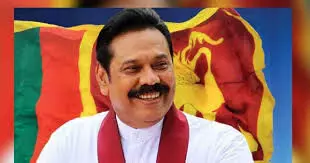
Racism getting upper hand in Sri Lanka too
text_fieldsIn the latest Sri Lankan parliament election, Sri Lankan People's Party (SNPP) led by the Rajapaksa brothers has won a landslide victory with two thirds majority, and thus looks all set to rule the island nation of 21 crore people. In the 225-strong parliament, the People's Party has won 145 seats by itself and with the five seats won by it allies, it has become strong enough to make constitutional changes. The act of Gotabaya Rajapksa in appointing his own younger brother Mahindra Rajapaksa may be seen only as a natural step.
Mahindra who has completed 50 years in Sri Lankan politics has also become president twice and prime minister three times. It is to be recalled that his younger brother Basil Rajapaksa is the founder of SNPP and its national organiser. Thus, our neighbouring country has come entirely under the dominance of the Rajapaksa family. When the United National Party (UNP) of Ranil Wikaramasinghe, who had become prime minister for four terms, could garner merely five per cent votes and just a single seat, it is evident that national politics of Sri Lanka will be marked by an extremely weak opposition both inside the parliament and outside. The party of Sajith Premadasa who split the UNP has won 54 seats, but that again can only ensure its presence as an opposition in the house. Although Tamil National Alliance, the Tamil minority's alliance in the north-eastern region, has won six seats, that is 3 seats short of what it won in the last election. A large section of Tamil voters have apparently supported those minority parties which were in tie-up with the SNPP. Muslim parties too had to be satisfied with two seats in their strongholds, even though when Muslims constitute ten per cent of the population.
What has emerged as a critical feature in the Sri Lankan general election outcome is a strengthening ultra-nationalist phenomenon, which started surfacing in many countries in the first decade of the 21st century and gathered strength in the second. The decline of Soviet Union and of the global Communist movement, gave an upper hand to both the capitalist economic forces and hyper-nationalist streams at the same time. In the absence of an alternative force based on humanism, universal brotherhood and unity, narrow minded and xenophobic racism of an emotional kind, which took the form of nationalism, succeeded in winning the support of populations to a great extent. This became manifest both in the US which put Donald Trump in the White House, and in European countries where the right wing either came to power or became the chief opposition.
If Vladimir Putin in Russia and Benjamin Netanyahu in Israel won on their own platforms, in India Modi-Amit Shah duo have taken their position in the same manner. The distinguishing plank of the neo-liberal right wing politics consists in instilling a false pride about the past, - real or imaginary - in the majority population, extolling its cultural greatness and singling out the minorities portrayed as a class with suspicious affinity to that majority stream. What has happened now in Sri Lanka is not much different: the Sri Lankan People's Party led by the Rajapaksa family has also capitalised on the weakness of the opposition and got itself entrenched in power with the support of Buddhists who form 70 per cent of the population, all riding high on the wave of Sinhalese nationalism. The secessionist movement of Veluppillai Prabhakaran's Tamil Eelam Tigers and the decades-long civil war in fact played a key role in sharpening the Sinhalese racism.
The fact that it was when Gotabaya Rajkapaksa became defence secretary that the Sri Lankan government was able to decisively crush Tamil tigers, became a factor highly favourable for the Rajapaksa family. Further, following the 2019 Easter day attacks on Christian churches in Colombo, Muslims as a community were put in the dock. Ever since then, Muslims had been subjected to incessant racial attacks at the hands of Buddhists. However, if the SNPP victory resulting from the combination of all these favourable factors, does not enable the president and prime minister to chart a course of peace and development, the future of Sri Lanka will cease to be promising. When big powers like China are in the prowl for an opportunity, the country may turn out to be a scene of disturbing intrigues. It will also be prudent for India to keep a close watch on the changes happening in its southern neighbour and make timely responses with wisdom.












